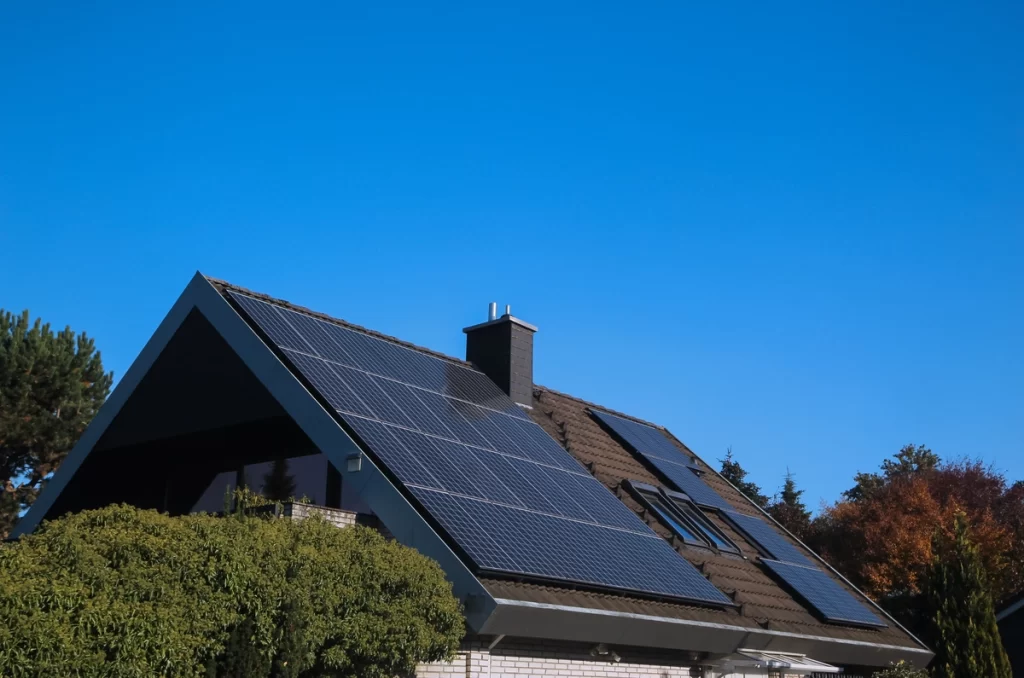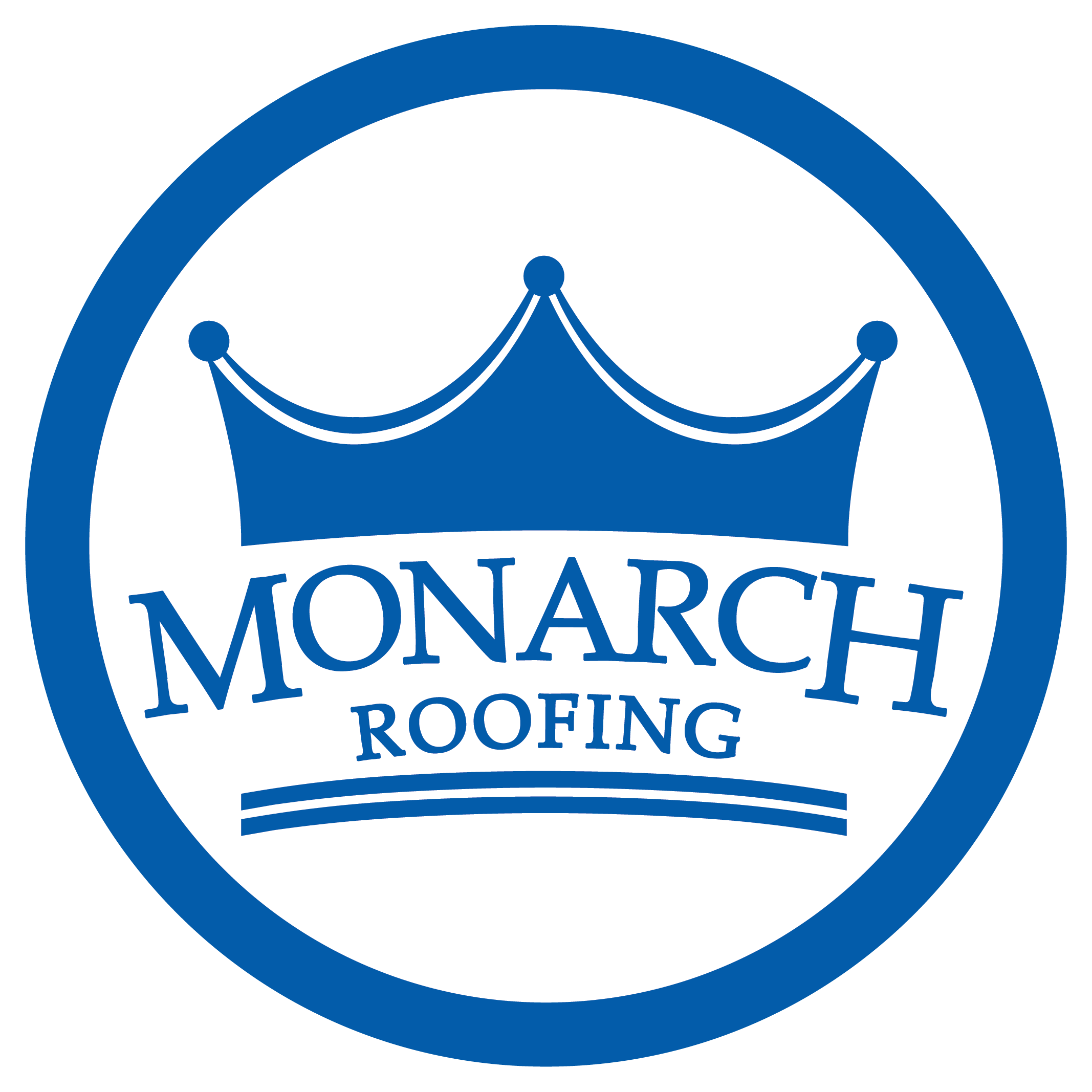Solar panels have been around for years, but only now are they starting to become commonplace for residential and commercial properties alike!
Solar power offers numerous environmental and financial benefits, but one lingering concern that often crops up is whether or not solar panels can damage your roof. We’re here to put your fears to rest with all the facts you need to know! We’ll dive into this issue, exploring:
- How solar panels work
- Why you should consider installing them
- Whether they have the potential to harm your roof
- The solar panel installation process
Put down your phone and stop Googling “do solar panels damage roof” because you’ve come to the right place!
And keep in mind that there are many solar roofing options!
How Solar Panels Work

Before we dive into the question of roof damage, it’s important to understand how solar panels work. Solar panels, also known as photovoltaic (PV) panels, are designed to capture sunlight and convert it into electricity. This process involves several key components:
- Photovoltaic Cells: Solar panels consist of numerous photovoltaic cells, usually made of silicon. When sunlight hits these cells, it energizes electrons within the material, generating an electric current.
- Inverter: The electric current generated by the photovoltaic cells is initially direct current (DC). However, most homes and appliances use alternating current (AC). Therefore, an inverter is used to convert the DC electricity into AC electricity that can power your home.
- Mounting System: Solar panels are mounted on a racking or mounting system that secures them to your roof. This system is essential for ensuring the panels remain in place and capture sunlight effectively.
- Wiring and Monitoring: Solar panels are connected to your home’s electrical system through wiring. A monitoring system may also be installed to track the performance of your solar panels and ensure they are generating the expected amount of electricity.
Why You Should Install Solar Panels
Now that we have a basic understanding of how solar panels work let’s explore why you should consider installing them on your roof:
- Renewable Energy: Solar power is a clean and renewable energy source. By harnessing the energy of the sun, you reduce your reliance on fossil fuels, which helps combat climate change and reduce greenhouse gas emissions.
- Lower Energy Bills: Solar panels can significantly reduce your electricity bills. By generating your own electricity, you can offset the energy you would have otherwise purchased from the grid.
- Financial Incentives: Many governments offer financial incentives, such as tax credits or rebates, to encourage the adoption of solar energy. These incentives can significantly reduce the upfront cost of solar panel installation.
- Increased Property Value: Solar panels can increase the value of your home. Potential buyers often view solar panels as a valuable addition, and studies have shown that solar-equipped homes tend to sell faster and at higher prices.
- Energy Independence: Solar panels give you a degree of energy independence. You are less vulnerable to power outages and fluctuations in energy prices because you generate your own electricity.
Now that we’ve highlighted the benefits of solar panel installation, let’s address the pressing question: do solar panels damage your roof?
Do Solar Panels Damage Your Roof?
The short answer is no, solar panels do not inherently damage your roof. In fact, when properly installed and maintained, solar panels can even extend the lifespan of your roof. Here’s why:
- Protection from the Elements: Solar panels act as a protective barrier for your roof. They shield it from the elements, including harsh sunlight, rain, and hail, which can contribute to the deterioration of roofing materials over time.
- Improved Roof Ventilation: Solar panel installation often involves raising the panels slightly above the roof’s surface, creating an air gap underneath. This can enhance roof ventilation, reducing the risk of moisture buildup and mold growth.
- Enhanced Energy Efficiency: Solar panels can help regulate the temperature of your home by blocking direct sunlight, which can reduce the strain on your HVAC system. This, in turn, can extend the life of your roofing materials.
- High-Quality Installation: To ensure your roof remains undamaged, it’s crucial to choose a reputable solar panel installer. Professional installers take steps to protect your roof during installation and adhere to industry standards.
- Routine Maintenance: Like any other part of your home, solar panels require regular maintenance. Keeping them clean and free from debris ensures they continue to function optimally without causing damage to your roof.
It’s worth noting that some older roofs may not be suitable for solar panel installation. In such cases, it might be recommended to replace the roof before installing solar panels. A professional solar installer can assess the condition of your roof and provide guidance on the best course of action.
The Solar Panel Installation Process: 6 Steps

Now that you’re convinced that solar panels are a viable option for your home, let’s briefly discuss the installation process:
1) Site Assessment:
A professional solar installer will visit your property to assess its suitability for solar panel installation. They will consider factors like roof orientation, shading, and structural integrity.
2) Design and Permitting:
After the assessment, the installer will design a solar panel system tailored to your specific needs. They will also handle the necessary permits and paperwork required for the installation.
3) Roof Preparation:
Before installation, the roof may require minor repairs or maintenance to ensure it can support the weight of the solar panels.
4) Installation:
The solar panels and mounting system are installed on your roof following the design specifications. Wiring is connected to your home’s electrical system, and the inverter is installed.
5) Inspection and Connection:
After installation, a final inspection is conducted to ensure the system meets safety and performance standards. Once approved, your solar panels are connected to the grid, and you can start generating electricity.
6) Monitoring and Maintenance:
A monitoring system may be set up to track your system’s performance. Regular maintenance, such as cleaning the panels, may also be required to ensure optimal operation.
Get Your Solar Panels Installed By a Pro!
Solar panels are a sustainable and financially sound investment for homeowners. Contrary to popular belief, they do not damage your roof when properly installed and maintained. In fact, solar panels can protect your roof from the elements and enhance its longevity. With the numerous benefits they offer, from reducing energy bills to increasing property value, solar panels are a smart choice for those looking to embrace clean and renewable energy solutions while maintaining the integrity of their roofing system. When considering solar panel installation, consult with a reputable solar installer to ensure the best results for your home and the environment.
At Monarch Roofing, we have the expertise you need to feel confident in your solar roof installation. Contact us today to get started!





